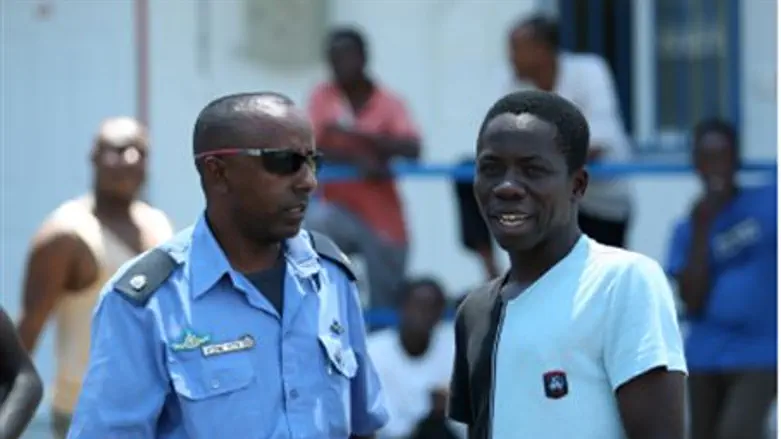
The Jerusalem District Court on Thursday issued a temporary restraining order which postpones the deportation of infiltrators from South Sudan until April 15. A government decision from January had stated that they must be deported by April 1.
The decision was made following a petition filed by organizations dealing in human rights and assistance to refugees. It also grants the infiltrators the right to group protection which had been taken away from them.
The organizations that filed the petition argued that there is concern for the safety and security of the citizens of South Sudan if they are forced to return to their country at this time. Earlier this week, direct clashes broke out between the armed forces of Sudan and South Sudan in disputed border regions.
Attorney Anat Ben Dor, representing one of the organizations that filed the petition, wrote in a written opinion submitted to the court, “There is real concern that the war in the region is beginning once again. Already, and in fact since South Sudan declared independence, fighting has occurred and has escalated. All this is happening alongside internal wars and a humanitarian crisis.”
Earlier on Thursday, the Foreign Ministry contacted the Interior Ministry and also asked to postpone the deportation of the South Sudanese. The government decision from January was based on a claim that South Sudan’s declaration of independence last year has signaled a return to normal in the region. However, the reports about growing violence in the region and the return of the Israeli envoy to South Sudan this week, have caused the Foreign Ministry to re-examine the decision.
MK Danny Danon, who chairs the Knesset Lobby for the problem of infiltrators, asked Foreign Minister Avigdor Lieberman on Thursday, following his Ministry’s request, to act immediately to deport the infiltrators.
“The citizens of Israel should not suffer for the deterioration brought by the infiltrators,” Danon said. “The current situation in South Sudan does not justify violence and crime in Israel.”
He added, “The infiltrators are not looking for shelter, they are looking for work. This is a fundamental danger for the State of Israel. The crime and the harm done to the economy are only the first step towards neighborhoods and cities across the country filled with infiltrators.”
Israel has long had problems with infiltrators from Africa who enter through the non-hermetically sealed border with Egypt, some falsely claiming refugee status although that is not the case. Many of them end up residing in the central bus station in Tel Aviv. The area looks surrealistically like an African country, in terms of population, stores and atmosphere.
In addition to Tel Aviv, cities in southern Israel such as Ashkelon, Sderot and Eilat have also seen their populations swell with thousands of Sudanese and Eritrean infiltrators over the past year.
Knesset Speaker MK Reuven Rivlin recently said that the infiltrators are not refugees but job seekers.
Speaking in Eilat, Rivlin said, “If these were refugees fleeing for their lives, we would have the moral obligation to open the gates and provide for their basic needs. However, those illegal entrants who reach Eilat are not refugees in the simple sense of the word. Many of them are not fleeing for their lives, but rather, looking to improve their financial situation.”
Rivlin called on the government to “come to a decision and set an official policy in this matter.”
